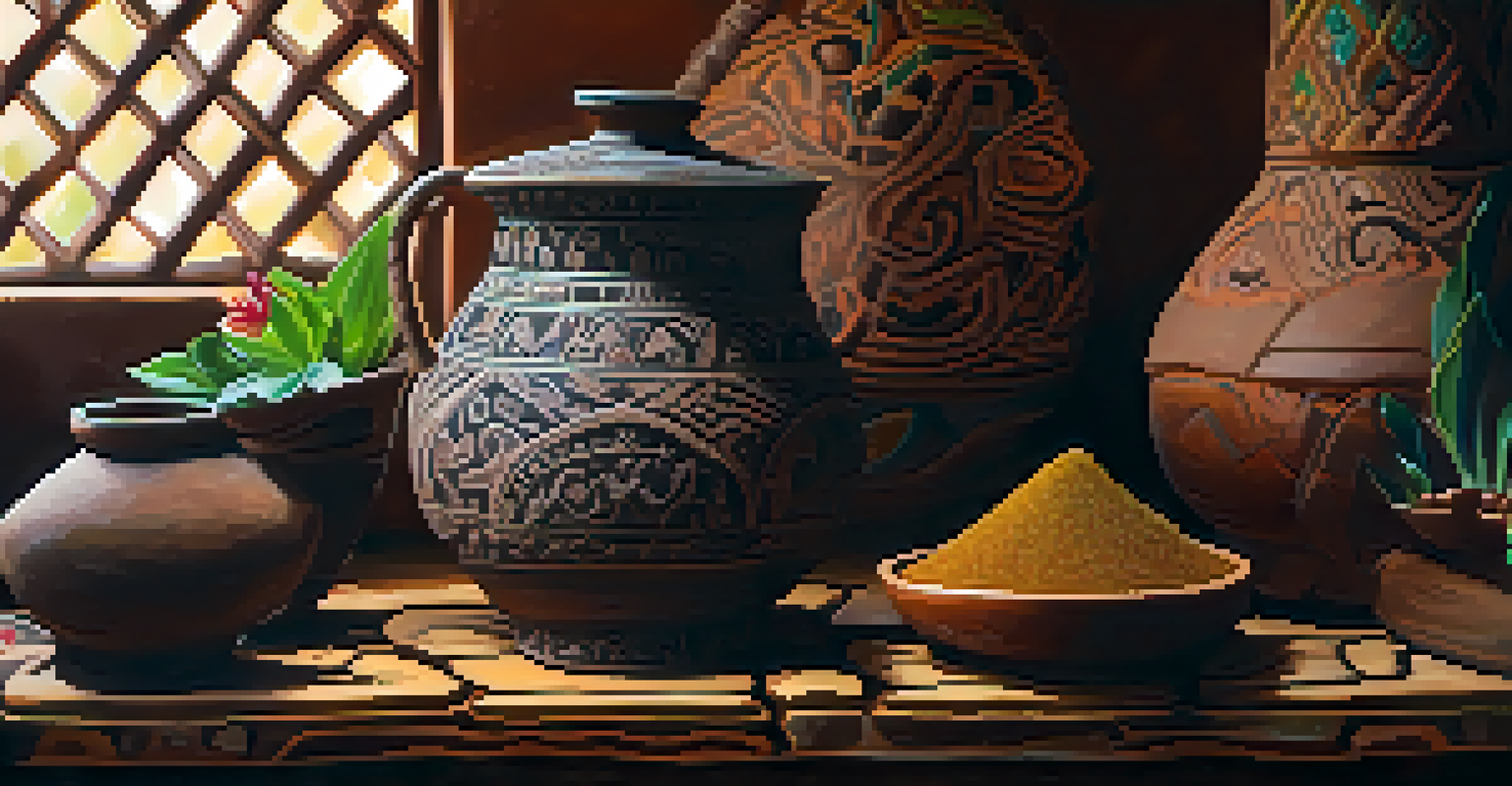Cultural Appropriation and Ayahuasca in Global Spirituality

Understanding Cultural Appropriation in Spiritual Practices
Cultural appropriation occurs when individuals adopt elements of a culture, often without understanding or respecting its origins. This practice can be particularly sensitive when it involves spiritual or sacred traditions, like those surrounding ayahuasca. Ayahuasca is a powerful psychedelic brew traditionally used by Indigenous peoples of the Amazon for healing and spiritual exploration.
Cultural appropriation is the theft of the cultural identity of marginalized groups.
When ayahuasca is used outside its cultural context, it can lead to a dilution of its significance. For many Indigenous communities, this brew is not just a substance; it is an integral part of their spiritual and healing practices. Therefore, it raises important questions about who gets to engage with these traditions and how they should be honored.
Recognizing cultural appropriation is crucial in promoting respectful engagement with other cultures. As more people seek out ayahuasca experiences in Western settings, the challenge lies in ensuring that these practices do not exploit or misrepresent their origins. Understanding the roots of cultural appropriation helps foster a more respectful dialogue about spiritual practices.
The Role of Ayahuasca in Indigenous Cultures
In Indigenous cultures, ayahuasca is revered for its transformative properties and role in healing. Shamans or healers guide ceremonies, allowing participants to connect deeply with their spirituality and the natural world. These practices are often accompanied by specific rituals, songs, and community involvement, emphasizing the collective nature of the experience.

For these communities, the use of ayahuasca is not just about the psychedelic experience; it is about relationship-building with the spirit world and nature. It’s a way to gain insights, heal traumas, and maintain cultural identity. This rich context is often overlooked by those who approach ayahuasca for personal gain or curiosity.
Cultural Appropriation Awareness
Understanding cultural appropriation is essential for respectful engagement with spiritual practices like ayahuasca.
Understanding the significance of ayahuasca in its native context encourages a deeper appreciation for its cultural roots. It helps outsiders recognize that their engagement with ayahuasca should be respectful and informed, rather than superficial or exploitative. Acknowledging this connection is vital for any meaningful spiritual journey.
Western Interest in Ayahuasca: A Double-Edged Sword
The increasing popularity of ayahuasca in Western societies brings both opportunities and challenges. On one hand, it provides avenues for healing and self-discovery for individuals seeking alternatives to conventional therapies. On the other hand, this surge can lead to commercialization and the commodification of Indigenous traditions.
When we engage with another culture, we must first listen and learn from those who have kept that culture alive.
Many retreat centers have emerged, offering ayahuasca experiences that often prioritize profit over authenticity. This can result in diluted ceremonies that lack the depth and cultural significance originally intended. Moreover, the lack of trained facilitators can pose risks to participants, both physically and spiritually.
To navigate this landscape, it’s essential for those interested in ayahuasca to seek out authentic experiences that honor its traditions. Supporting Indigenous-led initiatives and participating in culturally respectful settings can help bridge the gap between seekers and the communities that have safeguarded these practices for generations.
The Ethics of Ayahuasca Retreats
Ethical considerations are paramount when it comes to participating in ayahuasca retreats. Questions about consent, safety, and cultural respect must be at the forefront of any decision to engage in such experiences. Participants should be aware of the potential psychological effects and ensure that they are in a supportive environment.
It's crucial for retreat centers to prioritize ethical practices, such as transparency about their origins and the backgrounds of their facilitators. This helps create an environment of trust and respect, where participants can feel safe and valued. Additionally, facilitators should be well-trained in both the spiritual and psychological aspects of the ayahuasca experience.
Ethics in Ayahuasca Retreats
Ethical considerations, including consent and cultural respect, are crucial when participating in ayahuasca retreats.
Choosing an ethical retreat not only enhances the personal experience but also supports the sustainability of Indigenous practices. By being mindful of these factors, participants can contribute positively to the ongoing dialogue around cultural appropriation and spiritual exploration.
Bridging Cultures: Respectful Engagement with Ayahuasca
Engaging respectfully with ayahuasca involves more than just participating in a ceremony; it requires a commitment to understanding its cultural significance. This means educating oneself about the traditions, stories, and practices that surround its use. Such understanding fosters a sense of humility and respect for the cultures that have maintained these practices for centuries.
Building relationships with Indigenous communities can also lead to more authentic experiences. This collaboration can provide valuable insights into the spiritual dimensions of ayahuasca, allowing participants to appreciate its deeper meanings. Engaging in dialogue with those who have a lived experience of ayahuasca can enrich one's understanding and connection to the practice.
Ultimately, respectful engagement is about honoring the roots of ayahuasca while navigating its place in global spirituality. By approaching this journey with an open heart and mind, individuals can contribute to a more equitable exchange between cultures.
The Future of Ayahuasca in Global Spirituality
As ayahuasca continues to gain traction in global spirituality, its future will depend on how we approach cultural exchange. The balance between accessibility for seekers and respect for Indigenous practices is delicate but necessary. It’s crucial to ensure that as more people seek ayahuasca for healing, they do so with respect and acknowledgment of its origins.
There is an opportunity for more inclusive dialogues that elevate Indigenous voices in conversations about ayahuasca. By creating spaces for these communities to share their wisdom, the narrative around ayahuasca can shift from appropriation to appreciation. This would not only honor the traditions but also enrich the overall discourse on global spirituality.
Respectful Engagement with Cultures
Building relationships with Indigenous communities fosters a deeper appreciation and understanding of ayahuasca's cultural significance.
In moving forward, a collective effort is needed to advocate for ethical practices, education, and respect. This will help ensure that ayahuasca's role in spirituality is not just a trend but a meaningful practice that honors its deep cultural roots.
Conclusion: Navigating the Complexities of Ayahuasca Use
Navigating the complexities of ayahuasca use in a global context requires awareness and sensitivity. Understanding cultural appropriation, the significance of Indigenous practices, and the ethical implications of participation are all critical components of this journey. It’s about finding a balance between personal exploration and cultural respect.
As individuals seek spiritual experiences through ayahuasca, they must do so with a mindset of reverence and responsibility. This means acknowledging the origins, supporting Indigenous communities, and engaging with these practices in a way that honors their rich history. Through this approach, the potential for healing and connection can flourish.

Ultimately, the conversation around ayahuasca is part of a larger dialogue about cultural engagement in our increasingly interconnected world. By fostering understanding and respect, we can create pathways for meaningful spiritual exploration that benefits all involved.